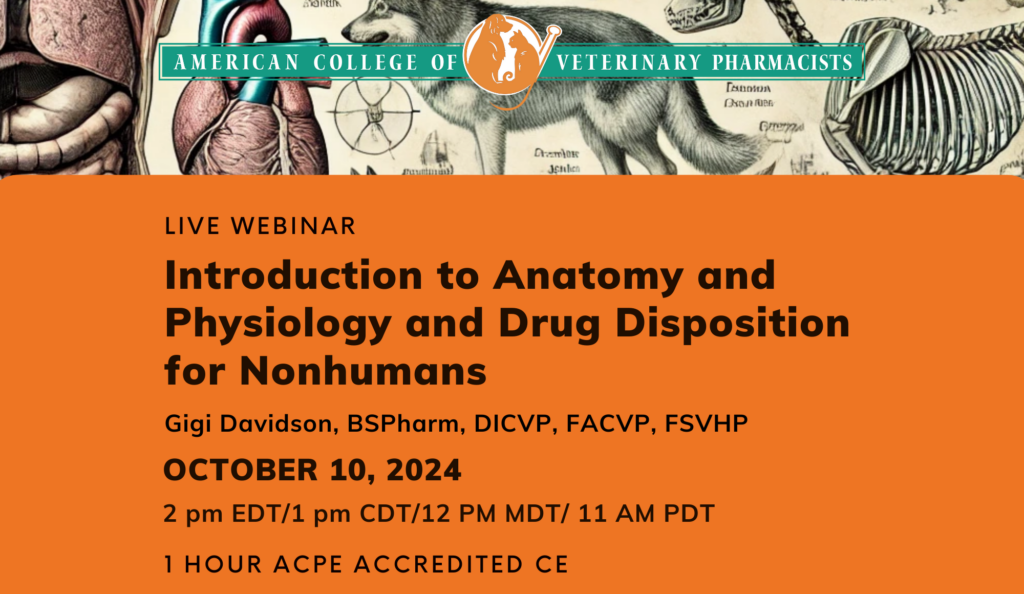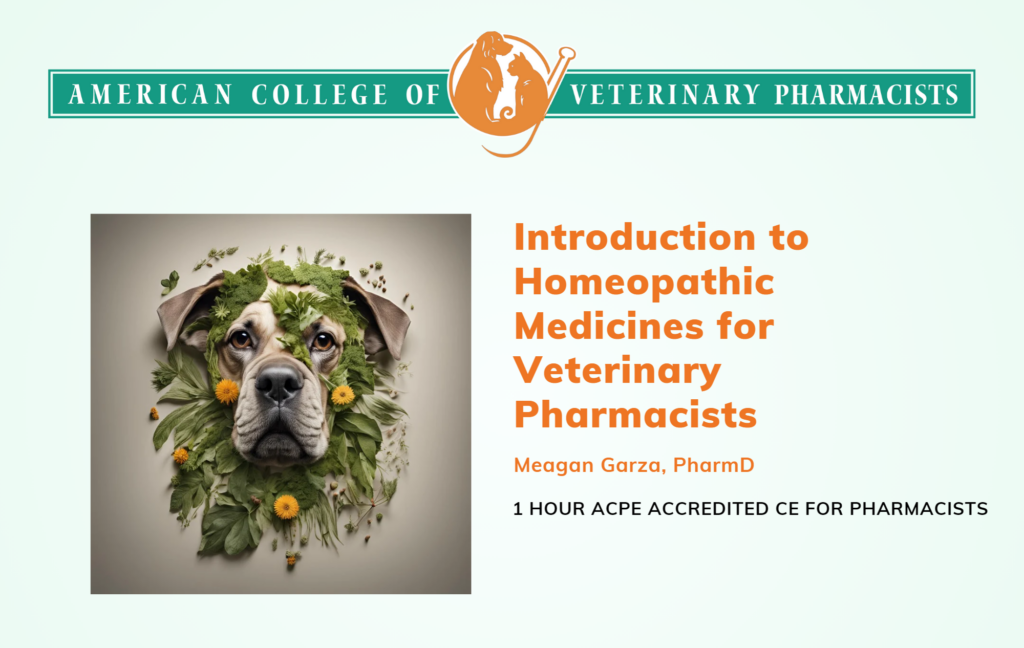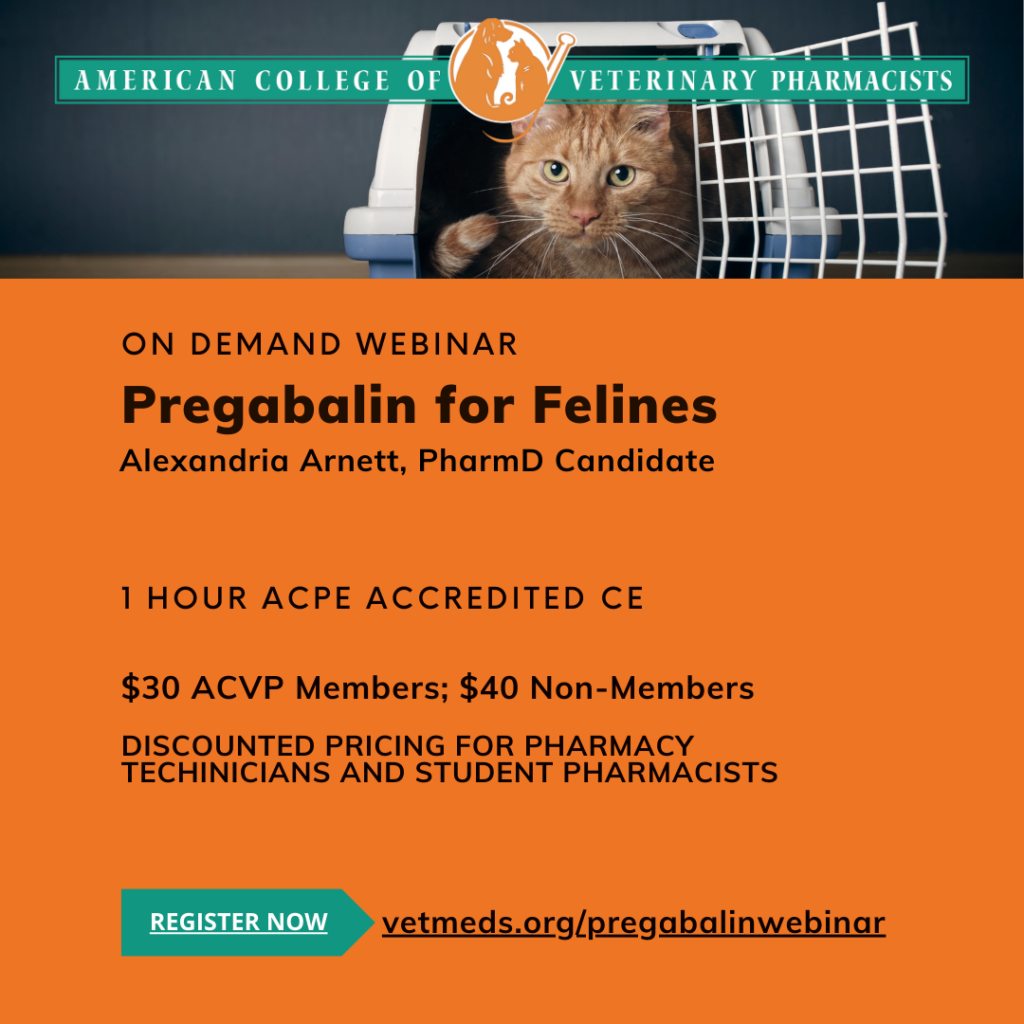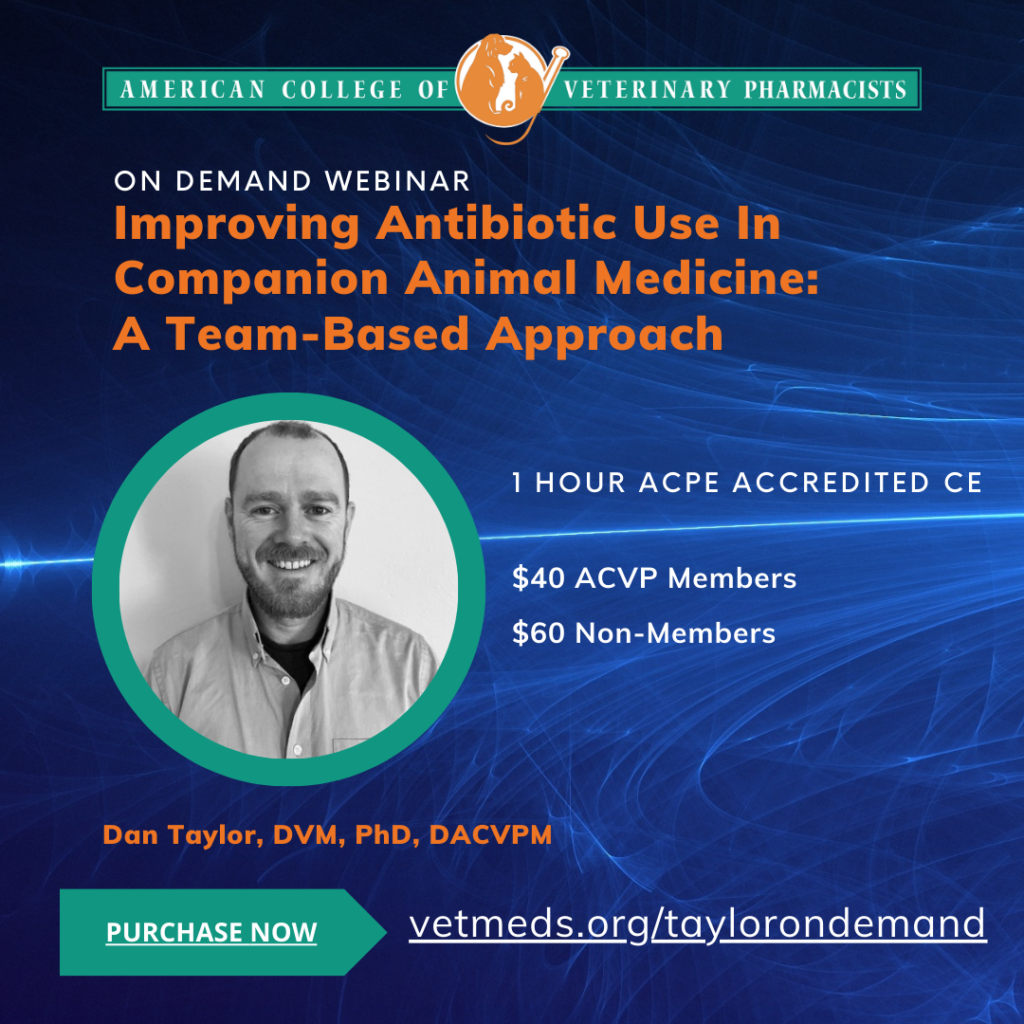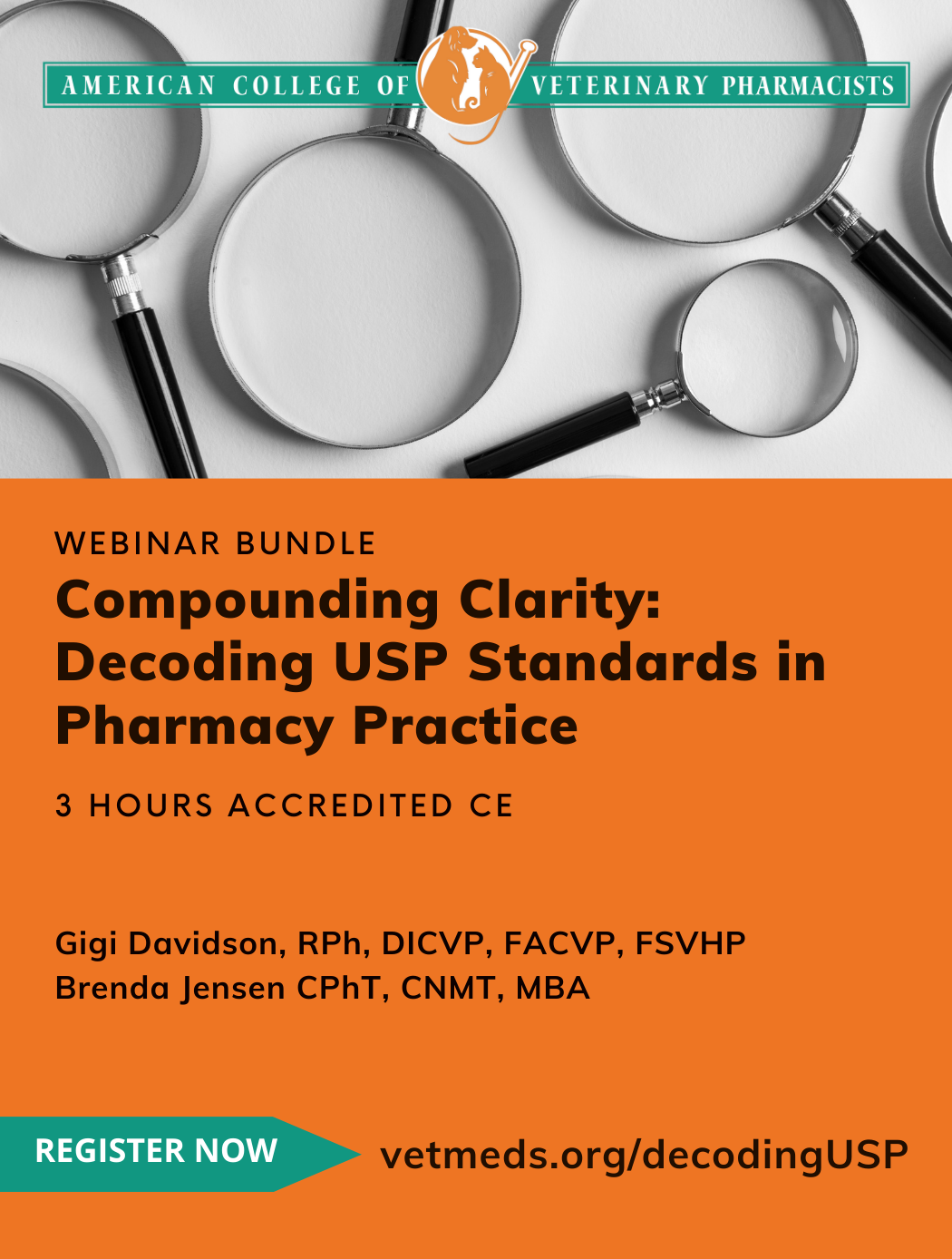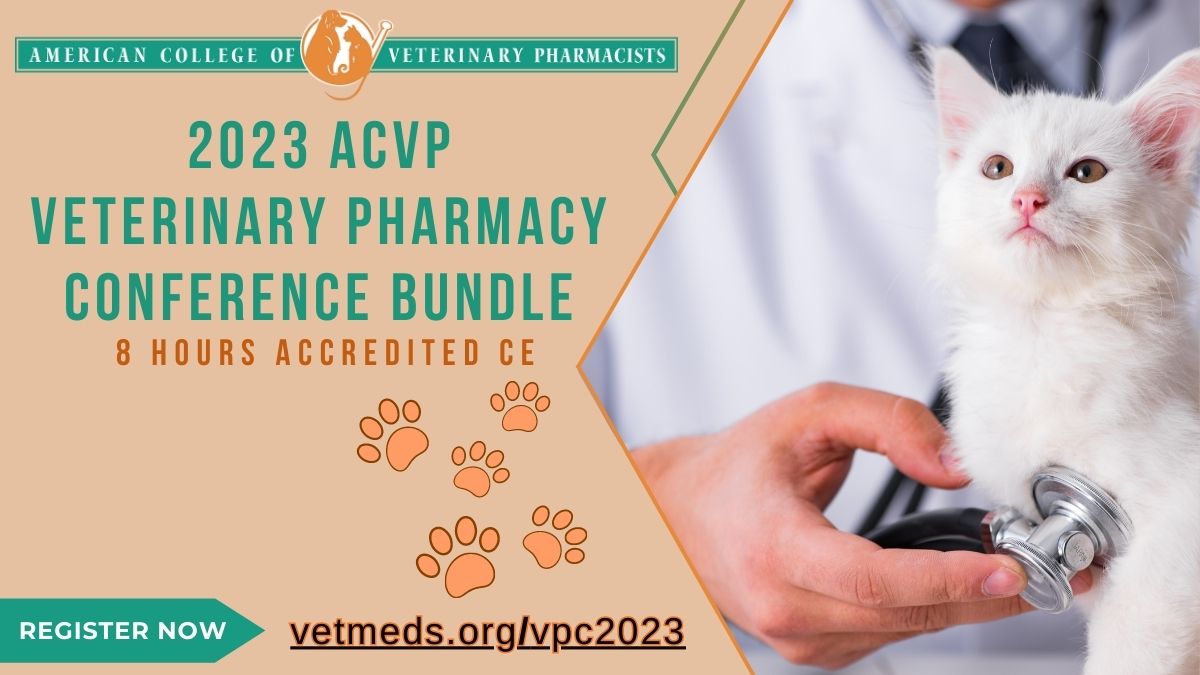Continuing Education, Pharmacy Compounding Training, and Conferences
ACVP Fellows & Members receive discounts on educational opportunities. For more information on joining The American College of Veterinary Pharmacists, CLICK HERE.
Online CE Opportunities Available:
October 10, 2024
2 pm EDT/ 1 pm CDT/ 12 PM MDT/ 11 AM PDT
Price: $40 ACVP Members; $50 Non-Members; discounted pricing available for pharmacy technicians and student pharmacists.
Overview –The purpose of this knowledge-based activity is to explore comparative differences in anatomy and physiology of companion animals versus humans and how those differences impact successful pharmacotherapeutic outcomes.
This webinar was originally presented on August 14, 2024.
Price: $30 ACVP Members; $40 Non-Members; discounted pricing available for pharmacy technicians and student pharmacists.
**NOTE: pharmacy technicians will not receive CE credit for this webinar**
Overview –The purpose of this knowledge-based activity is to describe the basic principles of homeopathy and review best practices for dispensing and administering homeopathic medicines to veterinary patients.
This webinar was originally presented on April 24, 2024.
Price: $30 ACVP Members; $40 Non-Members; discounted pricing available for pharmacy technicians and student pharmacists.
Overview – The purpose of this knowledge-based activity is to review pregabalin primary literature and the pharmacokinetics, pharmacodynamics, and proper administration techniques to allow for optimal counseling and education to pet owners.
This webinar was originally presented on January 12, 2024.
Price: $40 ACVP Members; $60 Non-Members
Overview – Research suggests that veterinarians often prescribe antibiotics to animals in an unsupported manner. Such prescribing patterns are concerning as they promote the development of antibiotic resistance in bacteria that can impact both animals and humans.
The Compounding Clarity: Decoding USP Standards in Pharmacy Practice Bundle is accredited for 3.0 contact hours (0.3 CEUs) of continuing education credit for pharmacists and pharmacy technicians.
GFI #256: How it affects compounding for veterinary patients, Brenda Jensen, CPhT, CNMT, MBA — 0.5 CE
This webinar will help veterinary compounders understand the requirements of GFI-256 and why such a document is necessary in the current federal landscape. Pharmacists and technicians will learn when FDA intends to use enforcement discretion regarding the compounding of animal drugs using bulk drug substances and how to comply with these requirements. They will also learn how they can nominate drugs to the list for compounding office stock drugs used for nonfood-producing animals.
Understanding the revision to USP <795> Pharmaceutical Compounding – Nonsterile Preparations, Brenda Jensen, CPhT, CNMT, MBA — 0.5 CE
This webinar will help pharmacists and technicians understand and prepare for changes to USP <795> Pharmaceutical Compounding – Nonsterile Preparations that will go into effect on November 1, 2023. The webinar will include differentiating dosage forms that may be compounded as nonsterile preparations and how to assign beyond-use dates as well as reviewing changes to facility, personnel, and documentation requirements.
Preparing for change: Key aspects of revised USP <797> Pharmaceutical Compounding, Brenda Jensen, CPhT, CNMT, MBA — 1 CE
This webinar will help pharmacists and technicians understand and prepare for changes to USP <797> Pharmaceutical Compounding – Sterile Preparations that will take effect on November 1, 2023. The webinar will include an overview of requirements including the transition to Category 1, Category 2, and Category 3 compounded sterile preparations and what each of these entails. Topics covered include requirements for facility and equipment, environmental monitoring, personnel training, and competency, documentation, and quality management.
Interpreting and Applying USP Compounded Preparation Monographs in Pharmacy Practice: Recipes for Quality, Gigi Davidson, RPh, DICVP, FACVP, FSVHP — 1 CE
Since 1820, USP has published Compounded Preparation Monographs (CPMs) with the goal of standardizing quality-assured formulas for the most commonly used compounded preparations for humans and animals. While most pharmacy professionals are aware of these monographs, many do not understand the significance and utility of each of the sections of a monograph. Join this webinar to learn where to find and how to interpret the meaning and intent of these unique “recipes” and how to apply them to your veterinary pharmacy practice.
Earn up to 8 accredited hours (0.8 CEUs) of continuing education focused on Veterinary Pharmacy when you purchase the
2023 ACVP Veterinary Pharmacy Conference Bundle:
- GFI #256: How it affects compounding for veterinary patients – 2023, Brenda Jensen, CPhT, CNMT, MBA — 0.5 CE
- Pearls and Innovations: Unique Patient Cases, Natalie Young, PharmD, BCSCP, FACVP — 1 CE
- Understanding the revision to Pharmaceutical Compounding – Nonsterile Preparations – 2023, Brenda Jensen, CPhT, CNMT, MBA — 0.5 CE
- Interpreting and Applying USP Compounded Preparation Monographs in Pharmacy Practice: Recipes for Quality, Gigi Davidson, BSPharm, DICVP, FACVP, FSVHP — 1.0 CE
- Backyard Chicken Basics, Miranda Sadar, DVM, DACZM — 2.0 CE
- Micro-Influencers”: The top dog when germs are in charge, Mark Wiencek, Ph.D. — 1.0 CE
- Preparing for change: Key aspects of revised USP <797> Pharmaceutical Compounding – Sterile Preparations, Brenda Jensen, CPhT, CNMT, MBA — 1.0 CE
- I’m Precepting a Veterinary Pharmacy Rotation, Where Do I Start? – A Preceptor’s Guide to a Veterinary Pharmacy Rotation, Thomas A. Magnifico RPh, FACA, FACVP & Tanner Trantham PharmD, FACVP — 1.0 CE

